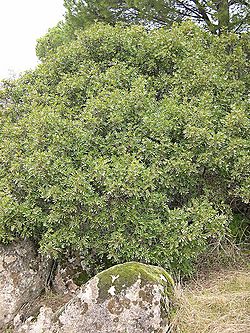Mastika facts for kids

Mastika or mastiha is a liqueur seasoned with mastic, a resin with a slightly pine or cedar-like flavor gathered from the mastic tree, a small evergreen tree native to the Mediterranean region. In Greece, mastiha (Greek: μαστίχα) or mastichato (Greek: μαστιχάτο) is a sweet liqueur produced with the mastika resin from the Greek island of Chios, which is distilled after hardening to crystals. Sugar is typically added. It is a sweet liqueur that is typically consumed at the end of a meal. It has a distinctive flavor, reminiscent of pine and herbs. It is claimed to have medicinal properties and to aid digestion.
In August of 2012, wildfires spread across the island of Chios, scorching 31,480 acres of land, and destroying more than half of the island's mastic orchards. Because the product has a “protected designation of origin” from the European Union, the fire not only impacted local Chios farmers, who lost approximately 60 percent of their crops, but also derailed the global supply of the product.
History
Mastic has been harvested for at least 2,500 years since Greek antiquity. The first mention of actual mastic 'tears' was by Hippocrates. Hippocrates used mastic for the prevention of digestive problems, colds and as a breath freshener. Roman emperors used mastic along with honey, pepper, and egg in the spiced wine conditum paradoxum. Digestive liqueurs, similar to Mastiha but made with grapes, were known as the Greek elixirs before the French Revolution.
See also
 In Spanish: Mastika para niños
In Spanish: Mastika para niños

